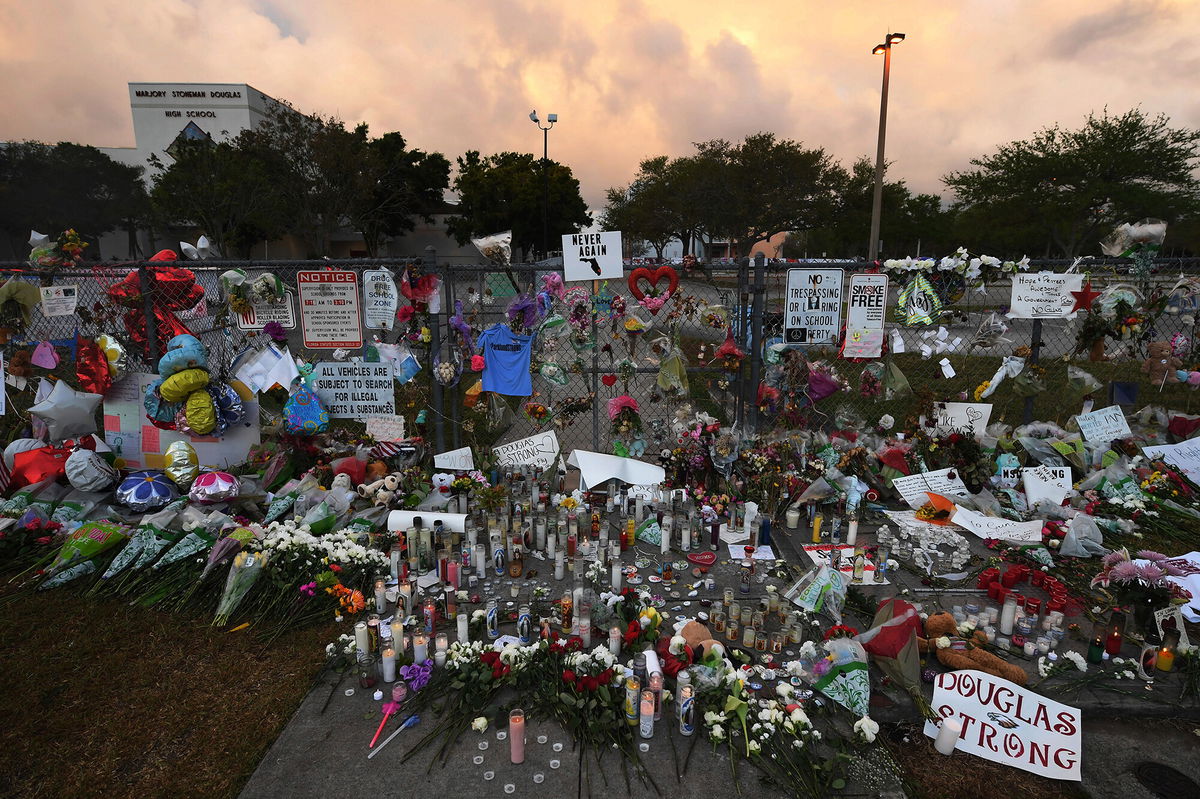Parkland gunman spent weeks making violent social media posts and searching online for information about mass shootings, testimony shows

A makeshift memorial is seen outside Marjory Stoneman Douglas High School in February 2018. According to testimony in the penalty phase of his trial
By Dakin Andone and Kevin Conlon, CNN
For months leading up to the Parkland massacre, Nikolas Cruz searched the internet for information and videos about mass shootings, leaving behind YouTube comments expressing his desire to “kill people,” according to testimony in the penalty phase of his trial.
Broward County Sheriff’s Office Detective Nick Masters, an electronic data analyst, took the stand Wednesday, where he read aloud dozens of Cruz’s Google searches, some of which included broad, generic search terms like “murder” or “shooting people.”
But Cruz also sought information about specific mass shootings, including those at Virginia Tech, in Las Vegas and at Columbine High School, and the people who carried them out, according to Masters’ testimony and a list of posts and searches released by the court. Cruz searched for how many rounds were fired in different mass shootings, as well as information about the weapon used in Las Vegas, Masters testified.
Some of the evidence revealed in court Wednesday was previously known. But the testimony gave jurors tasked with deciding if Cruz is sentenced to death a look at the full breadth of his online posts and searches, underscoring prosecutors’ arguments the defendant’s decision to carry out the shooting — in which 17 people were killed and 17 others injured — was not based on a whim, but calculated and premeditated.
Indeed, other searches appeared to show Cruz’s attention narrowing on Marjory Stoneman Douglas High School, from which he’d been expelled. Almost two weeks before the shooting, the then-19-year-old searched for a map of his former school, the list released by the court shows. The day before the shooting, Cruz searched for “how long does it take for a cop to show up at a school shooting,” and on the morning of the day of the shooting, he searched simply, “marjory stoneman douglas.”
Cruz, now 23, pleaded guilty in October to 17 counts of murder and 17 counts of attempted murder, and the ongoing phase of his criminal trial is to determine his sentence: Prosecutors are seeking the death penalty, while Cruz’s defense attorneys are asking the jury for a sentence of life in prison without the possibility of parole. If they recommend Cruz be sentenced to death, the jurors must be unanimous.
To make their decision, jurors will hear aggravating factors and mitigating circumstances — reasons why or why not Cruz should be executed. In his opening statement, prosecutor Michael Satz said there were seven aggravating factors, including that the attack disrupted a government function (i.e. school) and that the killings were “especially heinous, atrocious or cruel.”
“These aggravating factors far outweigh any mitigating circumstances,” Satz said at the time, “anything about the defendant’s background, anything about his childhood, anything about his schooling, anything about his mental health, anything about his therapy, anything about his care.”
The defense delayed its opening statements until later in the trial.
On Wednesday, Masters also read comments Cruz posted under different usernames — including his own name — on YouTube, including, “Im going to be a professional school shooter” just five months before he carried out the shooting. In other comments, Cruz wrote that he hated people and repeatedly reiterated his desire to kill people, per Masters’ testimony, and at one point promised to “go on a killing rampage.” In another comment, Cruz referred to himself as a “psychopath.”
One comment posted on the evening of October 31, 2017 — in which Cruz said, in part, “itsss ovvverrrrr” and “my … time is almost hearrrrrrr” — was made hours before his mother’s death, while she was in the hospital, a defense attorney pointed out.
All of the YouTube comments were “publicly available,” Masters testified in response to that attorney’s questions, adding that, as far as he was aware, Google and YouTube did not have a strategy for monitoring searches or comments for threats.
The trial, which is expected to last months, has already seen testimony from witnesses outlining Cruz’s actions before, during and after the shooting, including from the brother of one of the wounded victims, who testified Cruz sat next to him in a McDonald’s after the shooting and asked him for a ride home.
The shooting devastated the South Florida community and thrust victims’ families and teenage survivors into the national spotlight as they urged elected officials to pass legislation that would stem the tide of mass shootings.
The-CNN-Wire
™ & © 2022 Cable News Network, Inc., a WarnerMedia Company. All rights reserved.
CNN’s Carlos Suarez and Alta Spells contributed to this report.